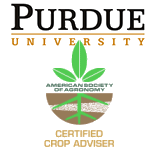
Proceedings 2004
Indiana Crop Adviser Conference
Corn Hybrids
Developing Corn Hybrids With New Traits
An inbred line is a strain that breeds true to type when individual plants of the strain pollinate themselves (when a plant pollinates itself, it is called self-pollination). All soybean cultivars that are sold in the U.S. are inbred lines (or blends of inbred lines) and seed production of soybean inbred lines is simple since soybeans are highly self-pollinated. On the other hand, corn hybrids are a cross of two inbred lines, which adds considerable complications to both the genetic improvement of the crop and to the production of seed for sale to farmers. The addition of new transgenic traits has added another layer of complexity to both breeding and production hybrid seed corn. This talk will provide a summary and overview of the following points: 1) reproductive biology of corn; 2) the role of genetics in the average increases in corn yields that have occurred over time; 3) a general overview of how new inbred lines and hybrids in corn are developed; 4) how traits controlled by transgenes are discovered; 5) how transgenes are integrated into hybrids sold to farmers; and 5) what technologies and traits are on the horizon.
Kendall Lamkey Iowa State Univ.krlamkey@iastate.edu
 Biography: Dr. Lamkey is the Pioneer Distinguished Chair in Maize Breeding and Director of the Raymond F. Baker Center for Plant Breeding at Iowa State University in the department of agronomy. From 1984 to 2002 he was a research geneticist and lead scientist with the Corn Insects and Crop Genetics Research Unit of the USDA Agricultural Research Service in Ames, IA. Dr. Lamkey is a member of the cooperative federal-state corn breeding project on the Iowa State University campus, which has been instrumental in developing novel and useful germplasm that has been widely used in the corn breeding industry. The main focus of Dr. Lamkey’s research has been quantitative genetics, recurrent selection methodology, and selection theory. Dr. Lamkey has a national and international reputation as an expert on corn quantitative genetics and selection response. He has authored or co-authored over 60 papers in refereed journals and numerous papers in conference proceedings, book chapters, published abstracts, and technical research reports. He is active in the regional (NCR) corn breeding meetings and has participated in the organization of several national and international conferences on heterosis and plant breeding. He has presented numerous invited lectures at national and international meetings. Dr. Lamkey has been active in graduate education at Iowa State University and has served as major advisor for 13 Ph.D. students and 4 M.S. students and has served on the program of study committee for 70 M.S. and Ph.D. students. He currently has 4 Ph.D. student and 2 M.S. students. Dr. Lamkey has been a member of Crop Science Society of America since 1980 and has served four years as an associate editor, 5 years as an technical editor, and is currently editor of Crop Science. Dr. Lamkey was elected a fellow of CSSA in 2002.
Biography: Dr. Lamkey is the Pioneer Distinguished Chair in Maize Breeding and Director of the Raymond F. Baker Center for Plant Breeding at Iowa State University in the department of agronomy. From 1984 to 2002 he was a research geneticist and lead scientist with the Corn Insects and Crop Genetics Research Unit of the USDA Agricultural Research Service in Ames, IA. Dr. Lamkey is a member of the cooperative federal-state corn breeding project on the Iowa State University campus, which has been instrumental in developing novel and useful germplasm that has been widely used in the corn breeding industry. The main focus of Dr. Lamkey’s research has been quantitative genetics, recurrent selection methodology, and selection theory. Dr. Lamkey has a national and international reputation as an expert on corn quantitative genetics and selection response. He has authored or co-authored over 60 papers in refereed journals and numerous papers in conference proceedings, book chapters, published abstracts, and technical research reports. He is active in the regional (NCR) corn breeding meetings and has participated in the organization of several national and international conferences on heterosis and plant breeding. He has presented numerous invited lectures at national and international meetings. Dr. Lamkey has been active in graduate education at Iowa State University and has served as major advisor for 13 Ph.D. students and 4 M.S. students and has served on the program of study committee for 70 M.S. and Ph.D. students. He currently has 4 Ph.D. student and 2 M.S. students. Dr. Lamkey has been a member of Crop Science Society of America since 1980 and has served four years as an associate editor, 5 years as an technical editor, and is currently editor of Crop Science. Dr. Lamkey was elected a fellow of CSSA in 2002.
